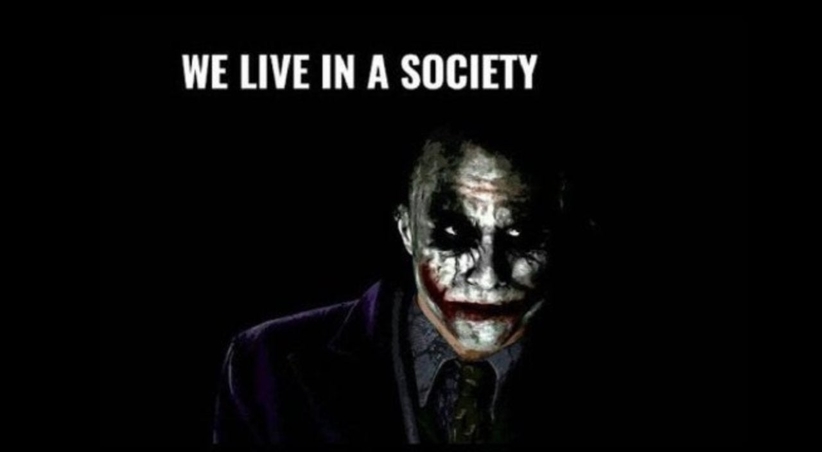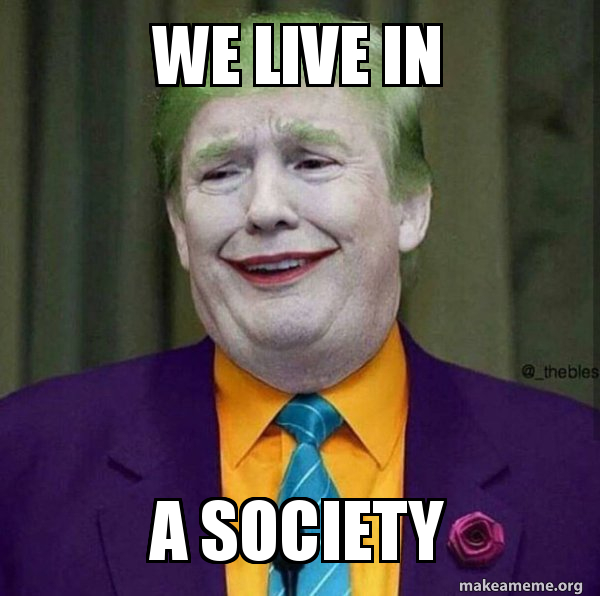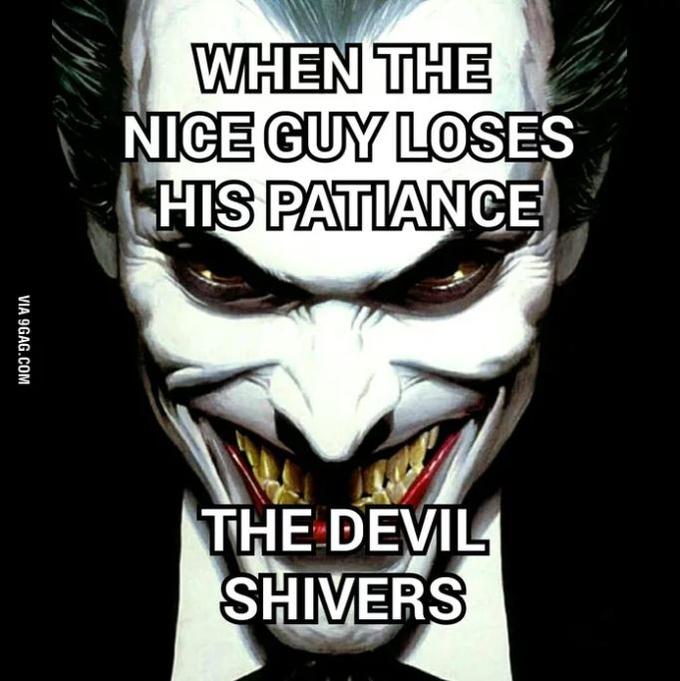The “we live in a society” meme is part of an internet culture of unapologetic absurdity which only makes sense from the inside looking out.
The “we live in a society” meme that you may (or TBH, may not have) seen floating across timelines and comment sections of the web has such a nuanced history that, 30 years from now, we’ll probably be seeing the meme dissected in textbooks as the pinnacle of 2015-2020 internet ethos.
The internet has a habit of folding in on itself. And as online humour grows increasingly nuanced and bizarre, it can be difficult for mere mortals to detangle it in order to understand. With stereotypes that are incubated in the depths of the web and un-clocked in the analogue world, it can make looking at one meme an internet history lesson in itself. So, for today’s lesson, here’s everything you need to know about the “we live in a society” meme.

Typically, the “we live in a society” meme is connected to the Joker, either featuring the character himself or editing other people to look like the green-haired, red-lipped man. If you aren’t aware of this meme – or have just come to accept you probably aren’t deep enough into the internet to get it – don’t worry, that’s the entire point of its appeal.
The meme is filed under the absurdist meme genre, that being, the flavour of memes that, from the outside, are totally nonsensical unless you have a strong and oddly specific back catalogue of internet acuity.

So where does “we live in a society” meme come from? The earliest trace of its origins can be found on Hong Kong-based meme site 9gag in April 2015. This is in the form of an image macro of the Joker, accompanied by the caption: “When the nice guy loses his patiance (sic) / the devil shivers.”
This particular meme struck gold for a few reasons. Firstly, the whole “nice guys finish last” gamer/incel superiority complex has long been a running joke in the commentary of 9gag.
This meme is just pure sardonicism: channelling the Joker to symbolise a higher than average IQ, and then misspelling “patience”. The joke wrote itself. As of a couple of months ago, the meme had garnered upwards of 38,600 points and 520 comments on 9gag, with much of the engagement boosted by ironic trolls wanting to make sure this meme became the absolute epitome of the meme site.

The DC supervillain has long been connected to the gamer identity, a sort of figurehead for a whole incel cyberworld syndicate following the release of the Dark Knight film in 2008. Online outcasts began to worship the Joker, believing they too embodied the misunderstood, highly intelligent social outcast, driven to villainy by the amorality of society. In a world where it’s impossible to compete, the nice girls chase after hot guys and neckbeards are left without girlfriends.
So, in that way, the Joker became a sort of re-contextualisation, a way to armour themselves with their difference. These people were proud of their nonconformist identity. It showed they were wiser, more woke. To them, the way the world operated was backwards: it rewarded parasites and liars. And so, they used these online spaces to vaunt how corrupt humanity was, and how, rather than society excluding them, it was they who refused to be a part of society.
We live in a society where the free thinking, open-minded people are considered “crazy” and the ignorant, closed-minded people are “normal”.
— Esoteric Exposal (@EsotericExposal) July 2, 2019
As these cringe, wannabe-profound memes became increasingly popular on sites like 9gag, they began to be enjoyed as pieces of satire on edgier online spaces like 4chan, Reddit, and shitposting groups on Facebook.
In the process, absurdist meme-makers began to pierce the elitist, counterfeit-intellect of the Joker symbolism, making their own memes with a sentence fragment that mocked the incel gamer ipseity, in what we now understand as the “we live in a society” meme. However, nowadays this meme has certainly diverged from its DC comic origins and the phrase has evolved into internet shorthand for being faux woke with a profound lack of self-awareness.
Everything happens so much. Because we live in a society pic.twitter.com/ZAjlL9EJh5
— Theo Kardasis (@theokardasis) July 30, 2019
While somewhat disputed, it is thought that the phrase “we live in a society” potentially originated from an episode of Seinfeld, where George Costanza channels his notorious hyper-macho superiority complex to sanctimoniously discuss the injustices of the episode’s payphone politics, and ultimately, the wrongs of the world. Seething, with clenched fists, he yells: “We’re living in a society!”
But, the “we live in a society” meme, like all great pieces of internet culture that came before it, has evolved far beyond this lo-fi Seinfeld reference and Joker origins. It’s even shed its “we live in a society” quotation, and can now appear as various forms of the original phrase, such as: “This says a lot about our society.”
Nowadays, the quip has well and truly embedded itself into everyday internet vernacular, symbolising an ironic and faux-woke realisation of life, and a peak example of internet culture.
The Link LonkKanye: we live in a society
twitter: pic.twitter.com/4bnWFaHw55
— Dolan Darkest (@sivemortenlol) April 19, 2018
September 29, 2020 at 12:12PM
https://ift.tt/3jdfApm
The "we live in a society" meme, explained - Happy Mag
https://ift.tt/2NM4zgB
Meme
No comments:
Post a Comment